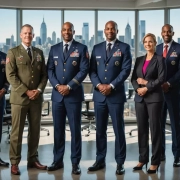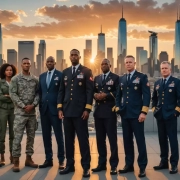From Service to Success: ADF Veterans Navigating the Civilian Career Transition
Navigating the transition from military to civilian life can feel like embarking on a journey through uncharted territory. For many Australian Defence Force (ADF) veterans, the shift from the regimented structure of military service to the fluid dynamics of civilian employment is no small feat. The challenges are real, but with the right support and strategies, veterans can find rewarding careers that harness their unique skills and experiences.
One of the first hurdles veterans face is translating military skills into civilian language. This isn’t just about swapping acronyms for plain English; it’s about recognising the value of military-acquired skills in the civilian job market. Leadership, discipline, and problem-solving are just a few of the attributes veterans bring to the table. Yet, without the right guidance, these can be overlooked by civilian employers who might not fully grasp their significance.
For instance, consider the role of a logistics officer in the ADF. This position demands exceptional organisational skills, the ability to manage complex supply chains, and a knack for strategic planning. In the civilian world, these skills are gold, particularly in industries like logistics, supply chain management, and operations. However, veterans often need help to see the connection and communicate it effectively to potential employers.
This is where tailored career support services come into play. Organisations like Ironside Resources are dedicated to bridging this gap, offering personalised guidance to help veterans identify and market their transferable skills. Their blog post, “Veteran Career Support Services Australia: Navigating the Path of Your ADF Transition,” delves into the specific challenges veterans face and provides practical advice on overcoming them. It’s a must-read for anyone looking to understand the nuances of this transition and the support available to veterans. Check it out here.
Crafting a civilian-friendly CV is another crucial step in the transition process. A well-structured CV that highlights relevant skills and achievements can make all the difference. It’s about telling your story in a way that resonates with civilian employers. Avoiding military jargon and focusing on accomplishments that align with the job you’re applying for can significantly increase your chances of success. If this sounds daunting, consider seeking professional help to ensure your CV stands out.
Networking is also a powerful tool in the civilian job market. Building connections with industry professionals can open doors to new opportunities and provide valuable insights. Attend industry events, join veteran support groups, and connect with former military personnel who have successfully transitioned. It’s not just about who you know, but who knows you. These connections can be invaluable as you navigate your new career path.
Education and training are other avenues veterans can explore to enhance their employability. Many find that pursuing additional qualifications helps them transition smoothly into civilian roles. Whether it’s vocational training, university courses, or online certifications, further education can open doors to new career opportunities and help veterans align their skills with their career goals.
Of course, the transition isn’t just about finding a job. It’s also about mental health and wellbeing. The shift from military to civilian life can be stressful, and it’s crucial to prioritise mental health during this time. Many veterans experience anxiety or depression as they navigate this new chapter. Seeking support from mental health professionals or veteran support groups can provide the necessary guidance and reassurance. Remember, taking care of your mental health is just as important as finding a job.
Success stories from fellow veterans can be incredibly motivating. Take John, for example, a former ADF engineer who transitioned into a project management role in the construction industry. By leveraging his leadership skills and technical expertise, John found a fulfilling career that aligns with his interests and strengths. Stories like John’s remind us that with the right support and determination, successful transitions are possible.
For those ready to embark on this journey, organisations like Ironside Resources offer invaluable support. Their veteran career support services are designed to help veterans navigate the challenges and seize new opportunities. Don’t wait any longer—take the first step towards a fulfilling career today.
For additional resources and support, the Australian Department of Veterans’ Affairs offers a wealth of information on transitioning to civilian life, including career support services and mental health resources. It’s a great place to start for veterans looking to make the most of their skills and experiences in the civilian world.


 Entrepreneur Network Australia
Entrepreneur Network Australia


